TRThursday: The Winchester – Theodore Roosevelt’s Rifle of Choice
Feb 26, 2015
“Personally, I have always preferred the Winchester. I now use a 45-90, with my old Buffalo gun, a 40-90 Sharps’ as spare rifle. Both, of course, have specifically tested barrels, and are stocked and sighted to suit myself.” – Theodore Roosevelt, Hunting Trips of a Ranchman
Though an avid hunter, Roosevelt was actually a poor shot due to trouble with eyesight of which spectacles could only partially help. In fact, it wasn’t uncommon for him to be made fun of because of his glasses, which were seen as a sign of weakness and fragility in his day. Nevertheless, Roosevelt proved himself to be a true out-of-doors-man both at home and abroad. While he may not have been able to out-shoot, he could certainly outlast any man on the trail, woods, or prairie and left a hunting legacy which has yet to be matched, and a tally of wild game kills well into the thousands. When a rifle was needed for the brush or plains, the repeating-action Winchester was his choice.
- #TRThursday articles give us some manly insight and wisdom from Theodore Roosevelt every Thursday. Sometimes a quote, sometimes a snippet of his life...always manly! Read other TRThursday articles here. -
Roosevelt’s Winchesters
“I don’t shoot well, but I shoot often!” – Theodore Roosevelt
Because of his extreme nearsightedness (meaning he could only see objects up close), finding an animal at a distance and setting his aim was a challenge. Having a rifle which could be brought to the shoulder, aimed, fired, and a new round chambered and fired while still being shouldered was a great advantage. Not surprisingly, when Roosevelt choose a new Winchester model, the world took note, and the Winchester’s chambered in whatever caliber fancied the Colonel quickly became hot items.
The 1876 45-75 Winchester
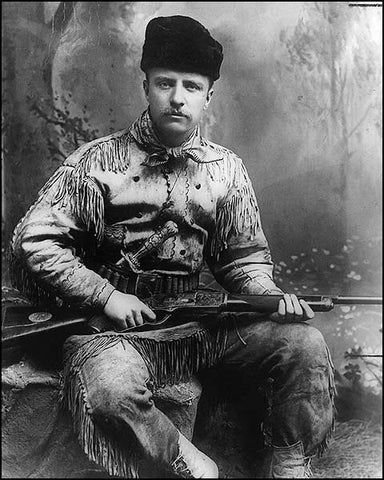
A Young Roosevelt with his 1876 45-75 Winchester Rifle
As far as we can tell from history, the Winchester 1876 was Roosevelt’s first hunting rifle he purchased for himself, at the age of 22. Like many of his custom Winchesters he would have made suited to his particular needs, his 1876 had a pistol grip stock, which is narrower than that of most rifle stocks. As the Colonel had relatively small hands and feet, especially when compared to his otherwise short but stout frame and even larger personality, the pistol-style grip was a perfect fit.
See more on the Roosevelt 1876 Model Winchester here.
The 1886 45-90 Winchester
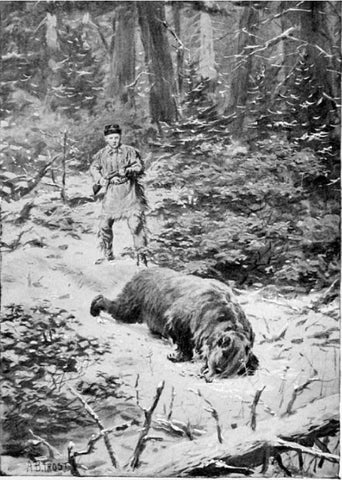
An artist representation of Roosevelt and the Grizzly.
By the year of 1887, when Roosevelt actually received his 1886 Model, Roosevelt had become a household name, especially among hunters. The 45-90 packed a bit more punch than his 1876 45-75. Looking at the difference in the size of cartridge, the difference seems negligible. However, the rifle may have saved his life.
One of Roosevelt’s greatest hunting stories is of him and the grizzly bear. In short, he took a shot at a grizzly but only wounded the bear. He followed at what he believed was a safe distance, expecting to see the bear walking slowly along a ridge where he could put the beast down. Just as he passed a thicket of brush, the bear emerged. Roosevelt had time to get one or two shots off and then dodge out-of-the-way. The shots however were not fatal, though they must have stunned the bear because it continued to lunge straight into a tree. Roosevelt, now on the ground, cocked the rifle just as the bloody, foaming animal came for another charge. He put a round right through the bears mouth and the animal dropped dead, just short of Roosevelt.
Have a better look at the 1886 Model here.
The 1894 Suppressed 30-30 Winchester
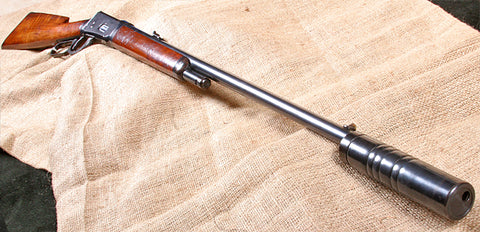
Roosevelt’s 1894 Suppressed Winchester 30-30. Original image from http://www.nrablog.com/post/2012/05/17/Teddy-Roosevelts-1894-Winchester-on-Curators-Corner.aspx
Let’s make one thing very clear: Roosevelt was friggin awesome! Could there be more of a contrast of character to the anti-gun president we currently have (Obama)? Even while Roosevelt was at his home, Sagamore Hill situated in Long Island, there were still “varmints” that needed a-killin’. Being the gentleman he was and not wanting to disturb his well-to-do neighbors, Roosevelt ordered a custom, silenced, Winchester in the now popular 30-30 cartridge to do the job. If you are a hunter, you’ll probably find this fairly amusing, because the 30-30 is what most hunters use to take down white-tailed deer and other large animals. Roosevelt was likely using it on gophers and other small animals where a .22 would likely get the job done! Keep in mind that the rifle was not scoped so Roosevelt had to rely on iron sights. I guess if you are hitting a small critter at 100 yards and no scope, it’s better to have a larger round to make sure the job gets done regardless of where you hit.
The 1895 30-03 Winchester
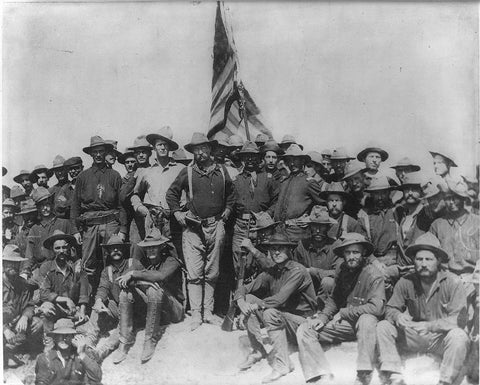
Roosevelt with his Rough Riders atop San Juan hill. He is seen without his 1895 Winchester because he gave it to another soldier who arrived late and was without a rifle.
For Roosevelt “The Warrior”, no rifle could supplant the Winchester, not even the popular Springfield 1898 (Krag). When the Rough Riders formed in 1898, Roosevelt made sure the officers would be outfitted with the 1895 Winchester chambered in the government issue .30, the same cartridge used by the noncommissioned officers for their Springfield’s. Roosevelt would have been pictured with his 1895 Winchester in the famous picture atop San Juan Hill, had he not given it to another soldier who arrived late to the troop and was without a rifle.
The 1895 may have been Roosevelt’s favorite rifle. Read more on the history of Roosevelt and his 1895 Winchesters here.
The 1895 .405 Winchester
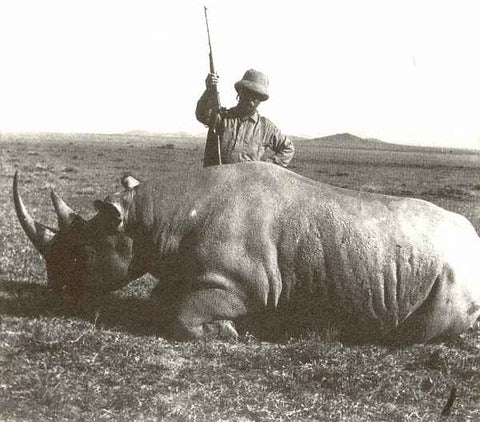
Roosevelt pictured next to a massive Rhino taken with his Winchester .405 on an African safari
Once Roosevelt became president the opportunities for big game hunting increased. When Winchester introduced the .405 cartridge in 1904, Roosevelt bought three 1895’s chambered for the round. He took his son Kermit on the expedition, but not knowing what rifle his son ought to use (except that it should be a Winchester), a letter was sent to Winchester asking for a catalog of current models from which to choose. Winchester sent the president 15 crates, yes crates, of rifles in various calibers to use for the safari. They primarily chose the 1895 chambered in 30-03 and .405.
Giving what was possibly the greatest endorsement of any president for a firearm, Roosevelt wrote:
“The Winchester .405 is, at least for me personally the medicine gun for lions!”
Not surprisingly, the sales of .405’s boomed!
Final Thoughts
Roosevelt was a voracious hunter, but also a serious conservationist, recognizing that the animals he loved to hunt were in danger of being wiped out by hunters much like himself. It is to him we owe a number of the national parks and conversationalist hunting clubs such as Boone and Crockett.
Many presidents since Roosevelt have been hunters, but none have been so connected to guns, battle, and hunting as Roosevelt. Thousands of other hunters can thank the Colonel for the popularity and continuation of their beloved rifles. Just think, each time you crack off a shot, you are experiencing something of the sound that thrilled one of the greatest men in history!

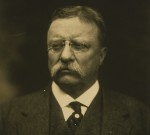 “Personally, I have always preferred the Winchester. I now use a 45-90, with my old Buffalo gun, a 40-90 Sharps’ as spare rifle. Both, of course, have specifically tested barrels, and are stocked and sighted to suit myself.” – Theodore Roosevelt, Hunting Trips of a Ranchman
“Personally, I have always preferred the Winchester. I now use a 45-90, with my old Buffalo gun, a 40-90 Sharps’ as spare rifle. Both, of course, have specifically tested barrels, and are stocked and sighted to suit myself.” – Theodore Roosevelt, Hunting Trips of a Ranchman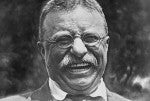 “I don’t shoot well, but I shoot often!” – Theodore Roosevelt
“I don’t shoot well, but I shoot often!” – Theodore Roosevelt
